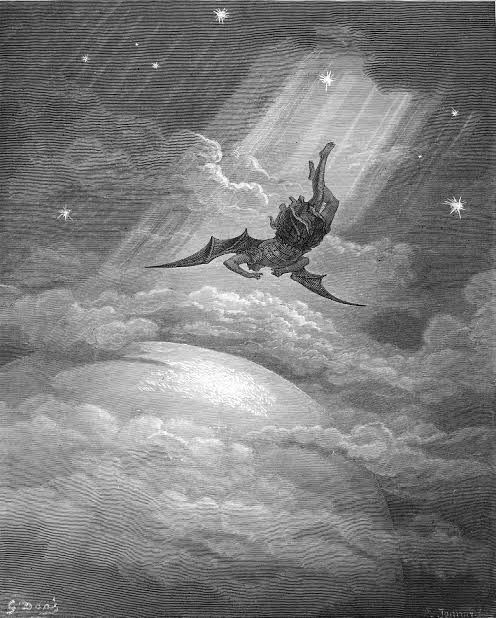
Fanfiction is an integral part of any fandom, including the God fandom. For centuries, people have been writing literature and poetry inspired by their favourite book, the Bible, but do they count as fanfiction? In its simplest definition, fanfictions are stories created by fans about existing media. Typically, fanfiction authors use the same plot, lore, and setting as the original, but they may add their own headcannons or create alternative lore (often called Alternate Universes or AUs).
This leads to an essential question: Do retellings of biblical stories count as fanfiction?
This question has long been debated. In this edition of Lit Corner, we look at the two texts most often considered to be classic religious fanfictions: Dante Alighieri’s 1321 narrative poem The Divine Comedy and John Milton’s 1667 epic poem Paradise Lost.
The Divine Comedy (La Divina Commedia)
‘Let us go, for the length of our journey demands it.’
The Divine Comedy is split into three parts: Inferno (Hell), Purgatorio (Purgatory), and Paradiso (Heaven), and depicts Dante himself travelling through these three sections, with the ancient Roman poet Virgil accompanying him through Inferno and most of Purgatorio. A woman named Beatrice, based on a real Florentine woman he met only a couple of times, guides him through Heaven, and the Cistercian abbot Bernard of Clairvaux guides him through the last three cantos of Paradiso.
We can use common fanfiction tropes to connect Dante’s work with the modern practice.
AU/Alternate Universe: The Hell depicted in the Bible has very few physical descriptions. It describes it as a place of eternal fire (Matthew 25:41), utter darkness (Matthew 8:12). It is place of everlasting destruction and alienation for God, and a place where God’s wrath is poured onto those who’ve sinned (2 Thessalonians 1:6-9, Romans 2:8). In fanfiction, AUs change elements from the source material’s canon. The Bible never depicts Hell as having nine levels, and it never tells us the intricacies of how Hell works, e.g. what happens to specific sinners. Dante’s Hell reimagines the Bible’s canonical Hell, making it an alternate Inferno.
Self-insert: The main character of The Divine Comedy is a fictional version of Dante himself. A Self-insert is when the author writes themselves into the story as a character. Self-inserts have been a part of literature and art for centuries, but it is also a popular form of fanfiction. People who write self-inserts often do so because they want a version of themselves to interact with their favourite (and sometimes least favourite) characters. Dante inserting himself into The Divine Comedy allowed him to journey with his favourite Roman poet and the love of his life, alongside meeting many historical celebrities and poets he liked. He also depicts many people he disliked — mainly politicians, Greek figures, generals, and Popes — in Hell. We love a hater.
Paradise Lost
‘Nine times the space that measures day and night to mortal men, he with his horrid crew lay vanquished, rolling in the fiery gulf confounded though immortal: but his doom reserved him to more wrath; for now the thought both of lost happiness and lasting pain torments him.’
Paradise Lost, put simply, is fanfiction of the Book of Genesis from the Bible. Often, a person writes fanfiction as a way of sharing their interpretation of things left unexplained in their favourite piece of media. As Emily Bartlett explains in her article “Milton’s Divine Fanfiction in Paradise Lost,” ‘Milton wrote his poem to further explain the Bible to his readers by pondering answers to questions the Bible does not answer: Why did Satan fall? Why did Satan trick Eve? What was Eve thinking when she ate the fruit?’
Milton spent a huge chunk of his life studying the Bible. He filled in the gaps of Genesis’s story, giving Eve a stronger voice, motivations, and internal dilemmas, and reasoning as to why she eats the fruit of knowledge, which was not previously explored in the Bible.
This means that Satan also gets complex characterisation instead of being portrayed as the essence of pure evil depicted in the Bible. In Paradise Lost, he is shown to be capable of love and good just as much as hatred and evil. Milton shows us Genesis through Satan’s eyes. According to Bartlett: ‘Milton was able to write Satan as more human-like without invalidating the contents of the Bible.’
Some of the beauty of fanfiction is taking beloved (or hated) characters and placing them in new situations or putting a spin on their original situation (Bartlett, 2020). Instead of merely wondering what happened within the gaps of our favourite stories, we create our own, with some even becoming literary classics centuries in the future.
Written by El Bancroft
Views: 41

